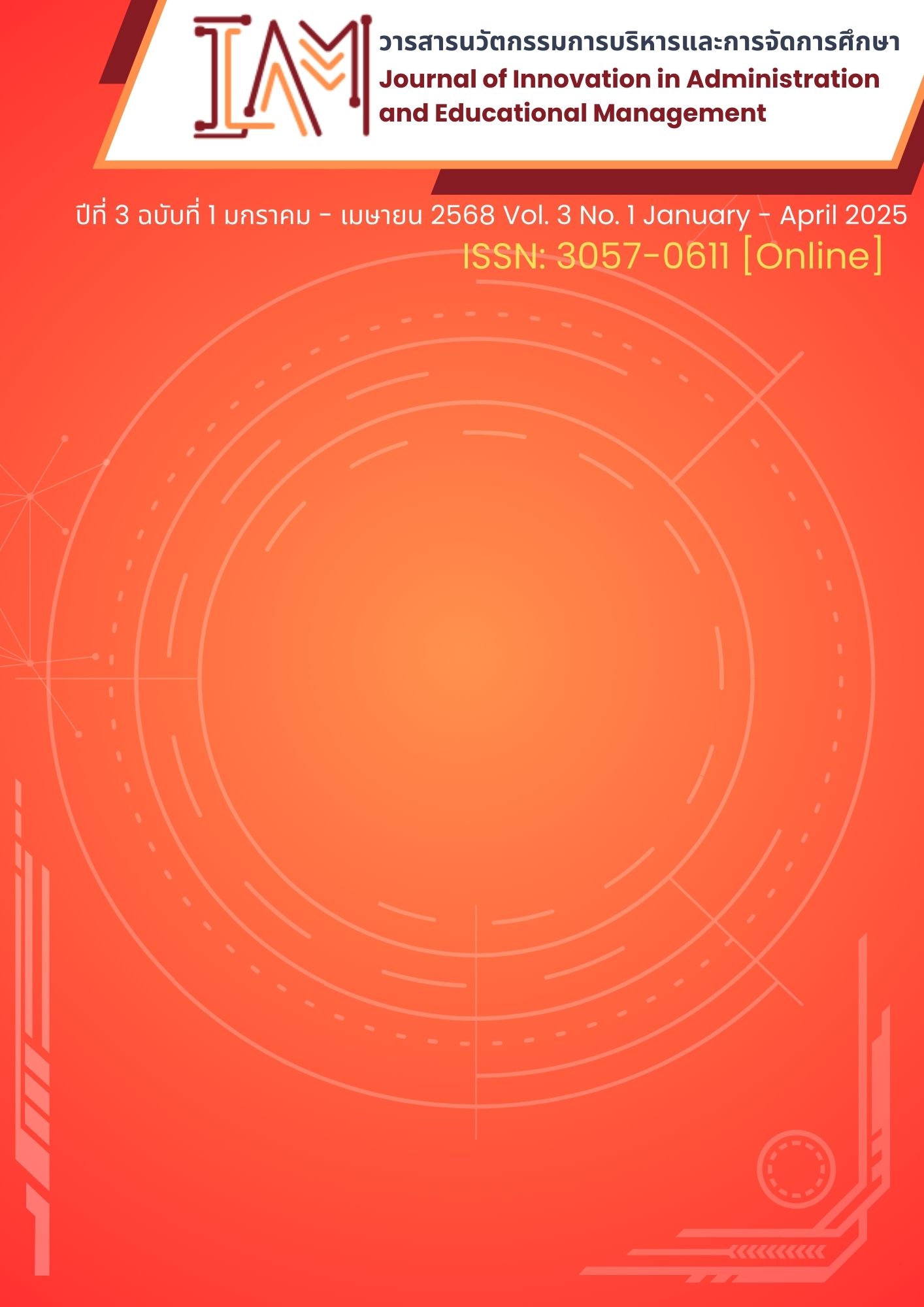Desirable Characteristics of Educational Administrators According to the Perspectives of Teachers in the Dipangkorn Witthayapat School Group under the Royal Patronage
Keywords:
Teachers in the Dipangkorn Witthayapat School Group under the Royal Patronage, Educational Administrators, Desirable CharacteristicsAbstract
The objectives of this research are: 1) To study the desirable characteristics of educational administrators according to the perspectives of teachers in the dipangkorn witthayapat school group under the royal patronage. 2)To compare the desirable characteristics of educational administrators according to the perspectives of teachers in the dipangkorn witthayapat school group under the royal patronage, classified by education level and work experience. The sample of 169 people of Teachers in the Dipangkorn Witthayapat School Group under the Royal Patronage. Stratified random sampling was conducted based on educational institutions. The research instrument used was a 5-point Likert scale questionnaire The reliability of the entire questionnaire was 0.985 Data analysis involved calculating mean scores () standard deviations (SD), Independent t-tests, and (one-way ANOVA). The research findings are as follows 1)The desirable characteristics of educational administrators according to the perspectives of teachers in the dipangkorn witthayapat school group under the royal patronage, were overall and in each aspect rated at the highest level.The average values from highest to lowest are: knowledge and ability characteristics,leadership characteristics, human relations characteristics,personality characteristics, respectively. and moral ethical characteristics .2) The comparison of desirable characteristics of educational administrators according to the perspectives of teachers in the dipangkorn witthayapat school group under the royal patronage, Classified by education level , overall and in each area, there was no difference. Classified by work experience, overall and in each area, there was no difference.
Downloads
References
กิ่งแก้ว ห้วยจันทร์. (2560). คุณลักษณะที่พึงประสงค์ของผู้บริหารสถานศึกษาตามทัศนะของครูในเขตอำเภอศรีราชาสังกัดสำนักงานเขตพื้นที่การศึกษามัธยมศึกษา เขต 18. (วิทยานิพนธ์การศึกษามหาบัณฑิต). ชลบุรี: มหาวิทยาลัยบูรพา.
ทัศนีย์ ทิพย์คงคา. (2564). คุณลักษณะผู้บริหารสถานศึกษาที่พึงประสงค์ของครูในโรงเรียนเขตอำเภอสามโคก สังกัดสำนักงานเขตพื้นที่การศึกษาประถมศึกษาปทุมธานี เขต 1. (วิทยานิพนธ์การศึกษามหาบัณฑิต). ปทุมธานี: มหาวิทยาลัยปทุมธานี.
ปัญญา บัวบาน. (2565). คุณลักษณะที่พึงประสงค์ของผู้บริหารสถานศึกษาตามทัศนะของครูกลุ่ม สหวิทยาเขตชลบุรี1 สังกัดสำนักงานเขตพื้นที่การศึกษามัธยมศึกษาชลบุรี-ระยอง. (วิทยานิพนธ์การศึกษามหาบัณฑิต). ชลบุรี: มหาวิทยาลัยบูรพา.
ลานนา รักงาม. (2563). การศึกษาคุณลักษณะที่พึงประสงค์ของผู้บริหารสถานศึกษาในศตวรรษที่ 21ในอำเภอแม่สาย สังกัดสำนักงานเขตพื้นที่การศึกษาประถมศึกษาเชียงราย เขต 3. (วิทยานิพนธ์ครุศาสตรมหาบัณฑิต). พะเยา: มหาวิทยาลัยพะเยา.
ศุภมาส วิสัชนาม. (2560). คุณลักษณะที่พึงประสงค์ของผู้บริหารสถานศึกษา สังกัดสำนักงานเขตพื้นที่การศึกษาประถมศึกษาจันทบุรี. (วิทยานิพนธ์ครุศาสตรมหาบัณฑิต). จันทบุรี: มหาวิทยาลัยราชภัฏรำไพพรรณี.
สุภาวดี พรหมทะสาร. ( 2561). คุณลักษณะที่พึงประสงค์ของผู้บริหารสถานศึกษามืออาชีพตามทัศนะ ของครูผู้สอนในโรงเรียน สังกัดกองการศึกษา เทศบาลเมืองมหาสารคาม. (วิทยานิพนธ์ครุศาสตรมหาบัณฑิต). มหาสารคาม: มหาวิทยาลัยราชภัฏมหาสารคาม.
สุรีรัตน์ โพธิ์เลีย. (2560). คุณลักษณะที่พึงประสงค์ของผู้บริหารสถานศึกษา ตามทัศนะของครู โรงเรียนในสังกัดองค์การบริหารส่วนจังหวัดชลบุรี. (วิทยานิพนธ์สาขาวิชาการบริหารการศึกษา). ชลบุรี: มหาวิทยาลัยบูรพา.
สุวิมล ติรกานันท์. (2549). การใช้สถิติในงานวิจัยทางสังคมศาสตร์ แนวทางสู่การปฏิบัติ. กรุงเทพฯ: จุฬาลงกรณ์มหาวิทยาลัยจุฬาลงกรณ์มหาวิทยาลัย
Cronbach, L. J. (1990). Essentials of psychological testing (5th ed.). New York : Harper Collins Publishers.
Krejcie, R. V. & Morgan, D. W. (1970). Determining sample size for research activities. Educational and Psychological Measurement, 30(3), 607– 610
Likert, R. (1967). The Method of Constructing and Attitude Scale in Attitude Theory and Measurement. New York: Wiley & Son.
Downloads
Published
How to Cite
Issue
Section
License
Copyright (c) 2025 Journal of Innovation in Administration and Educational Management

This work is licensed under a Creative Commons Attribution-NonCommercial-NoDerivatives 4.0 International License.






